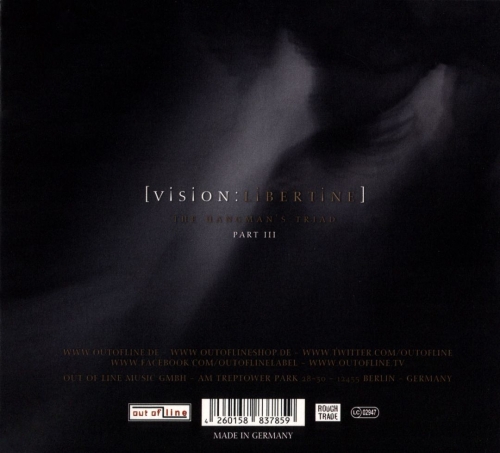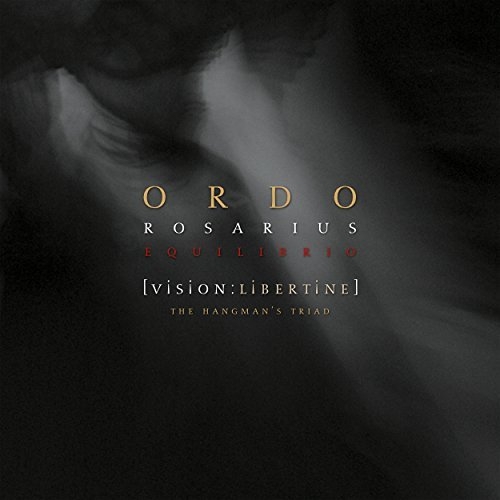
Ordo Rosarius Equilibrio - (Vision: Libertine) - The Hangmans Triad (2016) Lossless
BAND/ARTIST: Ordo Rosarius Equilibrio
- Title: (Vision Libertine) - The Hangmans Triad
- Year Of Release: 2016
- Label: Out Of Line
- Genre: Dark Ambient, Neofolk, Modern Classical
- Quality: Flac (tracks, .cue, log)
- Total Time: 01:09:25
- Total Size: 394 Mb
- WebSite: Album Preview

Tracklist:
CD1:
01. Eschatos and Hedone - The Killing of Ataraxia
02. Post-Evangelical Pilgrimage (Thus Spoke Tomas)
03. Flesh 4 Flesh & Kingdom comes
04. If Love was a crooked Cross and God was a Girl
05. The Fire, the Fool and the Harlot (The Hangman’s Triad)
06. The Name of the Star is called: Wormwood
07. Holy Blood, Holy Union
CD2:
01. The Misanthropic Polygamist (How Gods dream)
02. Vision Libertine (The Magnificence of Nihilism)
03. Venus in Nothing but Nylons and Pearls
04 .The White Rose of Dysphemism
05. Snow-White were the Stains and Paraphilia was her Name
06. The Tribalism of Tribadism (Evil Men have no Songs)
07. Four Pretty Little Horses and the four last Things on Earth
Tomas Pettersson left Archon Satani to form Ordo Equilibrio over twenty years ago, changing the name to Ordo Rosarius Equilibrio when joined by Rose-Marie Larsen. Until Songs 4 Hate & Devotion in 2010, they were releasing albums at a steady pace, consistently developing their pop/neofolk hybrid sound. Although there have been a handful of smaller releases since then, [Vision:Libertine]: The Hangman’s Triad is their first full-length album in six years. One might naturally wonder what has changed in that time.
The album has been in the works for a long time now. Back in 2014, Ordo Rosarius Equilibrio was asking fans to contribute photos for the album that was “just about” to be released, yet throughout 2015 there was no sign of its appearance. Now, in 2016, it has been released as a double album with those photos adorning the liner notes.
The album begins without fanfare, launching straight into some rhythmic piano and tribal drumming. All of the old Ordo Rosarius Equilibrio elements are there: hypnotic percussion accompanied by guitars, pianos, and orchestral instruments, all of which provide a bed for Pettersson’s half-spoken, half-sung lyrics. All of the old themes are present too, with lyrics expressing themes of sexuality, occultism, and Nietzschean individualism. The mood of the songs contains that familiar mixture of melancholy and defiance, varying within a rather narrow range between the weary tone of “Post-Evangelical Pilgrimage (Thus Spoke Tomas)” and the air of menace in “If Love Was a Crooked Cross and God Was a Girl.” There are some subtle variations in style: The dissonant horns on “The Fire, the Fool, and the Harlot (The Hangman’s Triad)” create an uncomfortable ambience, and “The Name of the Star Is Called; Wormwood” is a reading of the apocalyptic visions of the Book of Revelation. Yet, overall, the tone and pace of the first disc is very static, and it smolders more than it burns. The final track of the first half, “Holy Blood, Holy Union,” ends the disc on a subdued note, with quietly spoken lyrics that are underpinned by slow, solemn drumming.
It’s not until the second disc that Ordo Rosarius Equilibrio show more fire, beginning with the unusual rhythm and soaring chorus of “The Misanthropic Polygamist (How Gods Dream).” This is then followed by “Vision Libertine (The Magnificence of Nihilism)” which begins quietly and then bursts out with a thunderous and strident chorus. “Venus in Nothing but Nylons and Pearls” and the delicate “Snow White Were the Stains and Paraphilia Was Her Name” stand out as being unexpectedly touching. The densely orchestrated “Four Pretty Little Horses and the Four Last Things on Earth” ends the album on a proudly defiant note.
There seems to be a subtle change of mood in this album; it feels more somber than much of their previous work. There’s nothing here with the relaxed tone of “Long Knives, and Little Men” or “CUM, and Let Me Lead You Far Astray” from their previous two albums. Everything feels a bit more serious and tense. And in terms of instrumentation there’s a change too: Over the previous two albums, the project has flirted with a more electronic sound, with deliberately artificial-sounding drum machines. On [Vision:Libertine], there’s more of an emphasis on orchestral instruments and natural percussion. For this release, Ordo Rosarius Equilibrio have teamed up with Sal-Ocin of Empusae, who has provided subtle tribal drumming.
The most striking advance, however, is in the way that Pettersson has developed as a poet. As demonstrated by the unevenly rolling rhythm of “Flesh 4 Flesh & Kingdom Comes” or the intricate structures of “Snow White Were the Stains and Paraphilia Was Her Name,” this album shows greater variation in lyrical rhythms and a fine interplay of word and music.
If previous albums haven’t made you a fan of Ordo Rosarius Equilibrio, then you shouldn’t expect to hear anything in [Vision: Libertine]: The Hangman’s Triad that will change your mind. But for fans of the project, this will be a welcome return, and if you’re new to their sound, then this would be a fine place to start.
The album has been in the works for a long time now. Back in 2014, Ordo Rosarius Equilibrio was asking fans to contribute photos for the album that was “just about” to be released, yet throughout 2015 there was no sign of its appearance. Now, in 2016, it has been released as a double album with those photos adorning the liner notes.
The album begins without fanfare, launching straight into some rhythmic piano and tribal drumming. All of the old Ordo Rosarius Equilibrio elements are there: hypnotic percussion accompanied by guitars, pianos, and orchestral instruments, all of which provide a bed for Pettersson’s half-spoken, half-sung lyrics. All of the old themes are present too, with lyrics expressing themes of sexuality, occultism, and Nietzschean individualism. The mood of the songs contains that familiar mixture of melancholy and defiance, varying within a rather narrow range between the weary tone of “Post-Evangelical Pilgrimage (Thus Spoke Tomas)” and the air of menace in “If Love Was a Crooked Cross and God Was a Girl.” There are some subtle variations in style: The dissonant horns on “The Fire, the Fool, and the Harlot (The Hangman’s Triad)” create an uncomfortable ambience, and “The Name of the Star Is Called; Wormwood” is a reading of the apocalyptic visions of the Book of Revelation. Yet, overall, the tone and pace of the first disc is very static, and it smolders more than it burns. The final track of the first half, “Holy Blood, Holy Union,” ends the disc on a subdued note, with quietly spoken lyrics that are underpinned by slow, solemn drumming.
It’s not until the second disc that Ordo Rosarius Equilibrio show more fire, beginning with the unusual rhythm and soaring chorus of “The Misanthropic Polygamist (How Gods Dream).” This is then followed by “Vision Libertine (The Magnificence of Nihilism)” which begins quietly and then bursts out with a thunderous and strident chorus. “Venus in Nothing but Nylons and Pearls” and the delicate “Snow White Were the Stains and Paraphilia Was Her Name” stand out as being unexpectedly touching. The densely orchestrated “Four Pretty Little Horses and the Four Last Things on Earth” ends the album on a proudly defiant note.
There seems to be a subtle change of mood in this album; it feels more somber than much of their previous work. There’s nothing here with the relaxed tone of “Long Knives, and Little Men” or “CUM, and Let Me Lead You Far Astray” from their previous two albums. Everything feels a bit more serious and tense. And in terms of instrumentation there’s a change too: Over the previous two albums, the project has flirted with a more electronic sound, with deliberately artificial-sounding drum machines. On [Vision:Libertine], there’s more of an emphasis on orchestral instruments and natural percussion. For this release, Ordo Rosarius Equilibrio have teamed up with Sal-Ocin of Empusae, who has provided subtle tribal drumming.
The most striking advance, however, is in the way that Pettersson has developed as a poet. As demonstrated by the unevenly rolling rhythm of “Flesh 4 Flesh & Kingdom Comes” or the intricate structures of “Snow White Were the Stains and Paraphilia Was Her Name,” this album shows greater variation in lyrical rhythms and a fine interplay of word and music.
If previous albums haven’t made you a fan of Ordo Rosarius Equilibrio, then you shouldn’t expect to hear anything in [Vision: Libertine]: The Hangman’s Triad that will change your mind. But for fans of the project, this will be a welcome return, and if you’re new to their sound, then this would be a fine place to start.
Year 2016 | Rock | FLAC / APE
As a ISRA.CLOUD's PREMIUM member you will have the following benefits:
- Unlimited high speed downloads
- Download directly without waiting time
- Unlimited parallel downloads
- Support for download accelerators
- No advertising
- Resume broken downloads


